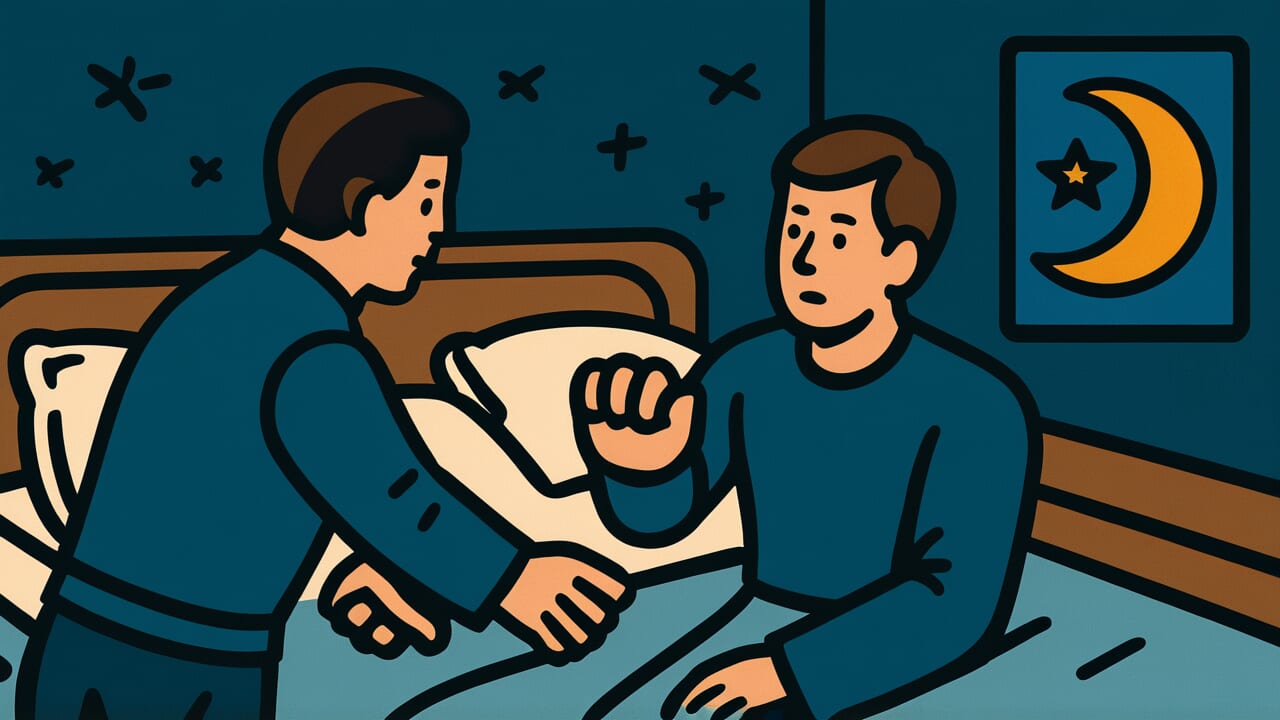How to Read “The night you hit someone, you cannot sleep”
Hito wo tataita yoru wa nerarenu
Meaning of “The night you hit someone, you cannot sleep”
This proverb means that someone who harms another person suffers more from their guilty conscience than the person they harmed.
When you hurt someone or do something terrible to them, you cannot sleep that night. Guilt and regret torment you.
The victim may feel anger or sadness, but they can eventually fall asleep. However, the person who caused harm loses their peace of mind. Their own conscience will not forgive them.
This proverb assumes that humans naturally possess a conscience. When you do something wrong, your own heart blames you, even if no one else does.
People use this saying to warn someone who is about to harm another person. It also expresses the suffering of someone who has already hurt others.
Even today, this phrase teaches us about the power of human conscience and the psychological price of wrongdoing.
Origin and Etymology
There are no clear records of when this proverb first appeared in literature. However, the structure of the phrase makes its meaning very clear.
The direct expression “hit someone” refers not only to physical violence but to any act that hurts another person.
The ending “you cannot sleep at night” represents the core of this proverb. Night is the end of the day, a time of silence.
When the noise of daytime disappears and you are alone, you must face your own actions.
What’s interesting is that this proverb focuses on “the person who hit” rather than “the person who was hit.”
Japanese spiritual culture has a tradition of valuing conscience and moral sense. Influenced by Buddhist ideas of karma and Confucian moral concepts, people have understood through experience that “doing bad things makes you suffer.”
This proverb probably arose naturally from the lives of ordinary people. The regret and guilt after hurting someone is a feeling humans have shared across all eras.
This saying expresses that universal psychology in simple, memorable words.
Usage Examples
- When I remember those harsh words I said, I truly understand what “the night you hit someone, you cannot sleep” means
- He is suffering from the profits he gained through dishonesty—he is exactly in the state of “the night you hit someone, you cannot sleep”
Universal Wisdom
The deepest truth this proverb reveals is that humans have the power to judge themselves.
Even without laws or the eyes of others, a moral compass exists within our hearts. That compass is our conscience.
What’s interesting is that this proverb focuses on “suffering” rather than “punishment.” You are not punished by someone else—you punish yourself.
This is an essential characteristic of being human. We are social creatures who evolved to live in harmony with others.
That’s why acts that hurt others disturb our own inner peace.
Thinking more deeply, this proverb describes the paradoxical relationship between perpetrator and victim. At first glance, the person who was hurt seems to suffer more.
But in the long term, as long as they don’t lose their conscience, the perpetrator carries deeper anguish. The victim heals over time, but the perpetrator must carry their actions for life.
This wisdom has been passed down through generations because it captures a psychological truth, not just a moral lesson.
Wrongdoing always comes back to you. That return is not punishment from outside, but the voice of your inner conscience.
When AI Hears This
The human brain operates like completely different processing systems during the moment of attack and the silence of night.
When you hit someone, your brain’s stress response activates the sympathetic nervous system. The rational judgment functions of the prefrontal cortex are temporarily suppressed.
In this state, empathy also decreases. You have no capacity to imagine the other person’s pain.
But at night, the situation completely changes. The parasympathetic nervous system becomes dominant, and the brain enters relaxation mode.
The mirror neuron system regains its original function. This system is a neural circuit that simulates others’ actions and emotions within your own brain.
In other words, the “experience of the other person’s pain” that was suppressed during the day gets replayed later at night. It’s like watching recorded footage after the fact.
Even more interesting is that darkness and silence heighten the activity of the amygdala. The amygdala processes fear and anxiety, and at night it responds sensitively to even minor stimuli.
Fear of possible retaliation from the other person or social punishment gets amplified. Heart rate increases and the state of arousal continues.
In other words, the human brain has “delayed feedback” rather than “immediate feedback” for aggressive behavior built into it. This time lag appears in the form of nighttime regret.
Lessons for Today
This proverb teaches us today about the weight of responsibility for our actions.
In our modern era with social media and the internet, it has become easy to hurt people you cannot see. Words through a screen may feel light, but your conscience knows.
It knows that those words hurt someone.
What’s important is to receive this lesson as hope, not fear. If you cannot sleep after hurting someone, that proves your heart is functioning normally.
The pain of conscience is proof that you have not yet lost your humanity.
In daily life, when you’re about to throw harsh words at someone, remember this saying. That action driven by a moment’s emotion might rob you of your own peace of mind.
Conversely, being kind to people is not just for their sake, but for your own sake too.
Peaceful sleep comes from a clear heart. Isn’t that the most valuable reward of all?



Comments